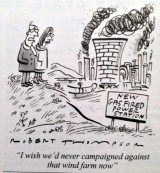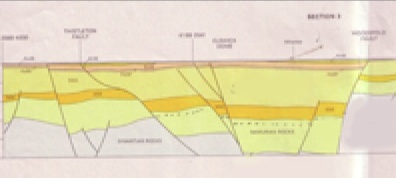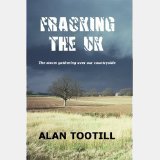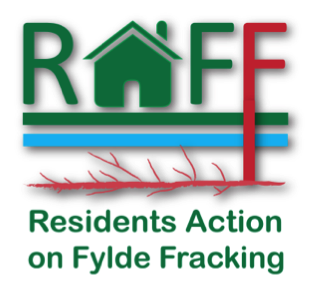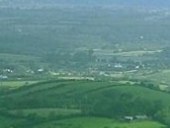Instead of a coherent energy policy Mr Osborne offers us juvenile pap
Sometimes, as we read about the Coalition Government’s clumsy attempts to justify their failure to put together a coherent energy policy to carry us through the next decades we smile. Sometimes we despair. Today was one of those days.
In a feeble attempt to bite back at Ed Milliband’s headline grabbing suggestions about price limits on domestic bills, today we read in the Telegraph that
Household energy bills are to be cut using a “tax bonanza” from fracking to strip out green levies, under Conservative plans. … One Cabinet minister said: “Fracking should deliver major tax revenues, so one idea is to rely on that money to fill the gap left by reductions in the environmental levies.”
So we have just had the Intergovernmental Panel on Climate Change announcing that the likelihood that anthropogenic global warming is causing climate change is approaching the level of certainty, and the following week we have to watch George Osborne and his chums desperately trying to make political capital by doing what? Reducing green subsidies and trying to fill the gap with taxes from increased fossil fuels.
Fiddling whilst the world warms? Quo Vadis indeed!
Meanwhile over at the Guardian we learn that The Liberal Democrats have dismissed a Conservative threat to cut renewable energy subsidies in order to reduce consumer bills as a “total red herring” while energy companies have warned that a political row over green policies will itself lead to higher prices.
Over at the Daily Telegraph, they finally lost patience with George Osborne and his games and published a damning editorial entitled “Getting giddy over shale won’t do much to keep the lights on“, which coruscates all parties over their failure to implement a strategic energy policy and contains the immortal line “At this rate of spending-before-drilling, it risks going down as the great phantom boom of the 21st century.“. When even the Telegraph starts to criticise the Conservative led coalition then the writing is well and truly on the wall.
So, under fire from all sides, the coalition is yet again in total disarray over what you might laughingly call it’s energy “policy”, which appears to be just a tale “Told by an idiot, full of sound and fury, Signifying nothing.”
What really made Cuadrilla abandon Anna’s Road
It was YOU!
Yesterday Cuadrilla announced their decision to pull out of Anna’s Road and to restore the site (as far as is possible) to its greenfield state.
Francis Egan claims that the reason for the abandonment is “technical constraints related to wintering birds”. He stated that their planning permission only allowed them to drill for 6 months of the year and that this did not allow them to develop the site.
Now we don’t believe for a second that Cuadrilla are so unprofessional that they weren’t aware of this limitation before investing the milions of pounds which they have now wasted at this site. They obviously felt at the outset that they could make this work in spite of the limitation, so what has changed?
The events down at Balcombe showed two things. First of all they showed that legitimate protest could play havoc with timetables and secondly they showed that an articulate and highly motivated general public could check on Cuadrilla’s activities and highlight areas where they were in breach – their breaches of noise levels and the issues around underground trespass being two cases in point. No longer it seems can Cuadrilla expect to be able to carry on operations for 3 months after permission runs out, ignoring key conditions to safeguard bird life, as they did at Banks in 2011. Now they know that if they make a mistake they will be delayed, and this would potentially prove very costly if it resulted in operations running into the 6 month window where they can’t drill.
Cuadrilla have already demonstrated at Banks that they have little real regard for the well-being of the pink footed geese and whooper swans of the Ribble Estuary. What has stopped them is no environmental concern. This abandonment has been caused by people power. It is without a doubt a victory for all those who have in so many ways campaigned against this destructive industry.
Of course this doesn’t explain the timing of the announcement. We wonder whether Cuadrilla have had this card up their sleeve for some time now but have been forced to play it now in the hope of stemming or offsetting some of the negative fracking has been attracting. This week we have seen the negative reaction to David Cameron’s “fracking capital of Europe” gaffe, and the ensuing critical editorial in the local press. Maybe they were forced into using this card now, but if so it’s a weak play as few people seem to have been taken in by their reasoning.
Anyway, we are so pleased that we put together a video to celebrate which has already been slagged of by shale gas supporters on the You Tube comments so it can’t be that bad!:-)
Correspondence with a councillor
My local County Councillor is Tim (20 mph) Ashton,
The Cabinet Member for Highways and Transport at Lancashire County Council can be seen here crossing Lytham Square, whilst apparently contravening rule 64 of the “Highway Code Rules for Cyclists” which states that “You MUST NOT cycle on a pavement. Laws HA 1835 sect 72 & R(S)A 1984, sect 129″.
At a meeting organised by Frack Free Fylde before the elections he was asked what he knew about fracking. He humbly professed not to know much at all. As nearly all the prospective councillor’s took the same tack, we did wonder whether this was a tactic to avoid having to answer any awkward questions, but to be honest he didn’t betray any sign of any knowledge which might have called his claim into question that night.
Here’s what we wrote at the time
Conservative candidate, Tim Ashton appears to have been able to ignore all of the furore over the last year or so as he claimed almost total ignorance of the subject. This is surprising as he sits on Fylde Borough Council so he surely can’t be unaware of FBC’s Task & Finish report on Fracking, and I know he has received the Refracktion newsletter as I delivered it to his house personally. Whilst this “ignorance” might excuse him for not expressing a view, it would suggest a total failure, as councillor currently representing Lytham, to engage with one of the biggest issues which will impact his constituency. He’ll have to forgive me for wondering if his ignorance was real or feigned, as I refuse to believe he is as dim as all that. Cllr Ashton left after the discussions and before the meeting finished, probably secure in the knowledge that as a Conservative candidate in Lytham he doesn’t need to bother over much with such trivial matters to get elected.
Anyway, after his triumphant re-election I wrote to County Councillor Ashton saying:
I’m very concerned about the prospect of fracking – or hydraulic fracturing – in our area.
Fracking has been linked to contamination of water supplies and atmospheric pollution, as well as increased traffic to construction sites. The government has promised lower energy bills if gas and oil from fracking is produced, but even the fracking companies admit this is unlikely to happen.
Given that Cuadrilla are planning to carry out fracking in this area, I would be grateful if you could let me know your position on the matter and what steps I can take to register my objections.
I would be grateful if you could keep me informed of any future developments.
he replied
I too am concerned about fracking, but realise that there needs to be a balance struck between energy supply and environmental and safety concerns.
I am therefore doing all I can to ensure that environmental and safety concerns are addressed.
To register your views I suggest you write to the relevant cabinet member at Lancashire County Council.
Well, to be blunt, I haven’t seen much, if indeed any, evidence of any activity here, but I’ll give a man the benefit of the doubt. He might have been beavering away behind the scenes.
I replied
Thank you Cllr Ashton
Could you please share with me some of these things you have done to ensure that environmental and safety concerns are addressed.
He came back with
The actions that I have taken and meetings that I’ve taken have been numerous and various over a long period of time. Please be assured that as your elected representative I am doing what is right for the people of Lytham, Fylde and Lancashire.
However if you have any particular questions that you would like answers to or concerns that you would like raised please forward them to me to pass on to the County Council.
It all still sounded a bit vague so I replied again
I am delighted to hear that “The actions that I have taken and meetings that I’ve taken have been numerous and various over a long period of time. Please be assured that as your elected representative I am doing what is right for the people of Lytham, Fylde and Lancashire. ” Indeed I would expect nothing less.
I did ask you to share with me some of these things you have done “to ensure that environmental and safety concerns are addressed”. It seemed a straight forward enough request to me, but if it needs clarification do please let me know.
Maybe you could provide a few examples of the various actions that you have taken “over a long period of time” and list a few of the various meetings you have attended?
5 weeks later he finally replied:
I have had meetings with the following:
LCC officers at many levels and professions.
FBC officers at many levels and professions.
The Health and Safety Executive
The Department of Energy & Climate Change
The Environment Agency
Fylde Borough Council’s Development Management Committee Members including the Chairman and Vice Chairman
Lancashire County Council’s Planning Committee members including the Chairman and Vice Chairman
Mark Menzies MP
Sajjad Kareen MEP, Sir Robert Atkins MEP and Jackie Foster MEP
Lorraine Fullbrook MP
Lancashire County Council’s Cabinet Member for The Environment and Planning
Fylde Borough Council’s Cabinet Members for Planning and The Environment
During all the above meetings I have studied the fracking process and made my concerns known regarding both safety and environmental impact.
I have attended a public meeting organised by Mark Menzies MP and a Pre Election Meeting organised by Frack Off.
I have listened to residents’ concerns and passed these on at the appropriate time.
Gosh!
We can only assume that all this has happened since he professed in May to know almost nothing about fracking. He really has been a busy chap hasn’t he! ![]()
Councillor Gordon McCann and the “criminals” of RAFF
According to Wyre’s Democratic Services department the committee, last night, considered the report into Cllr McCann’s behaviour, and adopted its recommendation that:
It is recommended that the appropriate sanction to be applied is to submit a formal report to the full Council meeting on 17th October detailing the nature of the breach (in effect “naming and shaming”) Councillor McCann.
It would appear from the report that
“the sanctions available in cases where there had been a breach of the Code of Conduct had been relaxed as part of a new national light touch standards framework.”
This is yet another perverse effect of Mr Pickles and his laughable entitled “localism”. Local councils, it seems have lost a lot of the power they had to censure effectively a councillor who breaches their code of conduct.
Although it was concluded in the report for the committee that
“The comments made by Cllr McCann were not in accordance with a number of the general principles contained in the Code of Conduct, namely, objectivity, integrity and honesty and as such amount to a breach of the Council’s Code of Conduct.”
we were told that all that will happen is that he is subjected to some minor embarrassment for having suggested, to a large audience at a major conference, that some public spirited and dedicated community activists are guilty of criminal activity.
Of course, if Mr Roberts and his colleagues at Raff are not satisfied with this, it would seem that this ruling might support a claim for damages?
Post Script
And here is the minuted account
Code of Conduct Complaint: Councillor McCann
The Monitoring Officer submitted a report on a Code of Conduct complaint received from Ian Roberts, Chairman of the Residents Action on Fylde Fracking (RAFF).
The Monitoring Officer explained the process he had followed in investigating the complaint, his findings of facts and the conclusions he had reached, as set out in his report. He answered questions from members of the Committee on the investigation process.
The Committee, having considered the information presented to it, accepted the findings and conclusions set out in the Monitoring Officers report.
The Committee then considered what would be an appropriate and proportionate sanction to apply.
RESOLVED:
(1) That the comments made by Councillor McCann were not in accordance with a number of the general principles contained in the Code of Conduct, namely, objectivity, integrity and honesty and, as such, amounted to a breach of the Council’s Code of Conduct.
(2) That a report of the Chairman of the Committee and the Monitoring Officer be submitted to the full Council meeting on 17 October detailing the nature of the breach and the decisions made (in effect “naming and shaming” Councillor McCann).
(3) That Councillor McCann be recommended to make a further apology recognising that the Residents Action on Fylde Fracking was a legitimate pressure group, that the apology should also refer to the outcome of the complaints proceedings and that a copy be sent to the organisers of the Shale Gas World Conference.
(4) That it be noted that responsibility for the apology rested with the individual Member who was the subject of the complaint, as it was the individual Member’s responsibility to observe the Code of Conduct and, accordingly, that the sanctions that could be imposed related to the individual Member and not the Council.
The BBC – Fracking Rubbish
Today the BBC put out a programme on Radio 4 – Inside Science – which claimed to get inside the science of fracking.
It was terrible. Sloppy journalism and bad science.
The list of badly reported programmes on fracking is long and ignoble – Iain Stewart’s Horizon programme springs to mind as another example of a programme which managed to please nobody and wasted thousands of pounds of licence payer’s money.
Today’s effort though exceeded all expectations.
It began with a patsy interview by Gaia Vince with Kris Bone, the Well Engineering Director at iGas. For some reason she interviewed him at a Coal Bed Methane Well. Coal Bed Methane is not quite fracking, but heck – this was only a science programme after all. Coal Bed Methane and Coal Seam Gasification are fracking’s twin ugly sisters, but let’s leave that for the moment.
We got the now standard story about how there was no visible surface impact at the well, which ignored totally the fact that with fracking we will get a repeated impact over 1000s of wells that is of only a few weeks duration per well, could last years per pad, but which would eventually leave a relatively peaceful surface area like the one they visited. We can only assume that Gaia, for all that her name sounds very green, was ignorant of the environmental realities here.
They might as well have taken her to the infamous Elswick well in the Fylde – yes the one that the Advertising Standards Authority criticised Cuadrilla for using as it was not comparable with what we all face from fracking. That one.
We had the story repeated that fracking isn’t new and Kris dutifully trotted out the obligatory “we’ve had 2000 onshore wells with 10% already fracked” patter, so beloved of the fracking propagandists, but comprehensively debunked by the DECC. There were no awkward questions from the lovely Gaia who seemed terribly excited and in awe of her interviewee. It made us wonder if it was maybe her first solo outing as a reporter.
Then we got the “scientists”. 4 “experts” talking about different aspects of fracking
We started with Contamination of Water Supplies
Richard Davies from Durham rubbished the Gaslands tap sequence and told us the risk of contamination of groundwater from fracking is incredibly low and “there is not a proven example of fracking causing contamination of ground water”. Yawn. That line is straight from the fracking propaganda playbook. Richard Davies isn’t always the worst of the academic supporters of shale gas, but he knows that anyone who has looked into this doesn’t think the risk is from fracking itself, but from the processes around it. Setting up the problem like this and then dismissing it is a common tactic, and one which, in our opinion, reflects very badly on the academic integrity of those who use it.
Dr David Rothery, Senior lecturer on Earth Sciences from the OU, attempted to reassure us that the people in Gasland were getting water from boreholes so we’d be OK in the UK – perhaps he is totally unaware that the Environment Agency tell us that 11% of Fylde households draw water from boreholes. But if so what on earth is he doing pontificating about matters on which he is so ignorant, and more to the point what are the BBC doing giving him a platform like this?
Back now to Richard Davies who finally grudgingly allowed that cementing failures and steel corrosion might increase the risk of water contamination. He very nearly got onto the subject of bonds for abandonment not being required. However, he just said he thought we needed to keep checking the wells after the operators had high tailed it. “No shit Sherlock!” as they say. Like we said he’s not the worst and to be fair it may just have been the editing separating his pieces which made the first part sound so questionable on its own.
Next we got onto the Chemicals
Prof Zoe Shipton from the Department of Civil Engineering of Strathclyde University did the bit about how the chemicals used were only things like you found in your kettle and baby’s nappies. Flow back water can apparently be “treated just like any other industrial effluent can be treated” . Perhaps she’s really not aware that the flowback fluid is radioactive? And perhaps as a civil engineer her expertise in chemicals leaves just a tiny bit to be desired? Just saying ![]()
Then we got onto Water Shortages Richard Davies gave this short shrift, but thank goodness he managed at least to restrain himself from using the golf course analogy. Northern England has LOADS of water. Less in the South of England but in South Africa there is a shortage. End of story apparently
And now – drum roll – Earthquakes
Of course we got Professor Mike (Brian Cox Wannabe) Stephenson from the BGS for this. He admitted that the 2 quakes in Lancashire were “probably” caused by fracking. He was at pains to point out that the two earth quakes were very very small and stated “they couldn’t have caused any damage”. Now Cuadrilla have a board at their public consultations which quotes Prof Stephenson as saying exactly that. The thing is that we know, they know, and most importantly perhaps, HE knows very well that the earthquakes did indeed cause damage. It’s beyond debate now. The casing of the well at Preese Hall was ovalised over a long distance. Cuadrilla’s failure to understand and report and this damage earned them a severe reprimand from Charles Hendry, the then Energy Minister. There is no way that Stephenson does not know this. Why does he keep saying it and allowing it to be used by the frackers as a quote? If he worked for the industry we’d understand, but he’s supposed to be a respected academic! If he’d like to offer an explanation we’d be glad to publish it.
Stephenson rounded off his piece by telling us that there was really nothing to worry about as man made earthquakes are quite common. Yes really! It’s all OK. Honestly.
Then we had what sounded like our new friend David Rothery with the best bit yet! – They are not quakes they are tremors – the earthquakes would have happened anyway and they might have been stronger if we’d waited so we should really be grateful to fracking for setting them off earlier! So there you have it! Fracking is saving us from earthquake damage! Fantabulosa! This short piece must take the prize for the most ludicrous justification of fracking ever heard on mainstream media anywhere in the world at any time so far. Congratulations David.
Prof Mike came on again to tell us that if you are going to frack you really do need to make sure there are no faults in the area – it’s “really very very important” apparently. Somehow he forgot to mention that the Preese Hall tremors happened because nobody had a bloody clue whether there was a fault there or not. In fact the Fylde is known to be faulted, so according to what Stephenson says here it’s all over. Game Set and Match – Time for Cuadrilla to pack up. Except they won’t will they? Own goal Prof?
Finally they addressed the environmental issue – or rather we had Zoe again – she waffled on about how huge our resources are before admitting that if we burn all that we’ll add a significant amount of CO2 to the atmosphere. David now came on again to tell us that “fracking is a very good stop gap to get our own gas” (whatever that means) and told us that the alternative is buying gas from “the Russians”. Maybe he doesn’t really know that most of our imports currently come from Norway, Holland and Qatar, with Qatar being replaced by the USA in the near future. Or maybe he does but the Pesky Rusky’s story sounds better eh Dave?
Overall this was a horse’s arse of a programme. Badly researched, factually inaccurate and totally one sided. If Cuadrilla and Igas had commissioned it themselves they couldn’t have hoped for a better result.
The BBC really does need to do better than this to justify it’s licence fee!
What the Elphicke are we supposed to believe?
Politicians eh?
Last night it seems that Charlie Elphicke, Conservative MP for Dover, underwent something of a Damascene conversion.
Mr Elphicke made a bit of a Charlie of himself last week, when he was caught out getting rather mixed up about the differences between coal bed methane and underground coal gasification (AKA Fracking’s ugly sisters) on the radio. This led to him receiving this letter from Julie Wassmer, Vice Chair, East Kent Against Fracking :
Dear Charlie Elphicke,
RE: EXPLORATORY BOREHOLE APPLICATIONS BY COASTAL OIL & GAS LTD
I write to you not as a constituent but in my role as Vice Chair of East Kent Against Fracking, following comments you made during an interview on BBC Radio Kent last Wednesday 18th September. I provide here an I-Player link to the programme: http://www.bbc.co.uk/programmes/p01g15tp which can be accessed until midnight on Tuesday 24th September.
Your interview concerned recent planning applications submitted to Kent County Council by Coastal Oil & Gas Ltd. The company wishes to conduct exploratory drilling for coal bed methane gas at 3 sites on the former east Kent coalfields at Shepherdswell, Guston and Tilmanstone. I was interviewed on the same programme an hour before your own exchange with Richard Knox-Johnstone, Chair of CPRE – Protect Kent Environment.
During the interview, Mr Knox-Johnstone made reference to the high risk of contamination to the Chalk aquifer from exploratory drilling for coal bed methane gas at the 3 sites, such warning having been given by hydrogeologist Graham D.Warren. I also made reference to Mr Warren’s warning during my own interview.
Your reply to Mr Knox-Johnstone was as follows: ‘I think the CPRE have got muddled up between 2 processes because there’s fracking on the one hand and there’s underground coal gasification, which is effectively a form of modern mining on the other, which doesn’t involve high pressure and all this sort of water.’
Mr Elphicke, I feel compelled to point out that it is you who appears to have confused two processes during this discussion, since underground coal gasification (UCG) is entirely distinct from drilling for coal bed methane (CBM). The fact that you could possibly confuse these two processes while suggesting that the Chair of Kent’s CPRE was ‘muddled up’ would seem as ironic as it is unfortunate.
The Chalk aquifer, upon which the 3 sites are located, supplies no less than 70% of Kent’s domestic and commercial potable water requirements. These applications are therefore highly relevant to a great number of Kent residents and businesses beyond the immediate site areas. I would therefore suggest that during any media discussion, accuracy is essential to prevent any misrepresentation for the public.
You also stated the following: “the Government is keen to explore, there’s no doubt about that. My own view is let’s see if we’ve got stuff down there. If we’ve got stuff down there, let’s see if we can lift it up safely. Is there a potential for a future coal industry in these fields?’ Perhaps your government should first concern itself with providing proper regulation to ensure that the unconventional gas and oil industry is made safe before any exploratory drilling (in villages in east Kent or elsewhere) is allowed to go ahead. Your reference to a ‘potential for a future coal industry in these fields’ has surely given listeners the impression that test drilling for coal bed methane gas might somehow result in the resurrection of a coal industry in this area – something that would be highly misleading.
I am greatly disappointed by the inaccuracy of your comments but I am not wholly surprised by them since I am in receipt of copies of responses from my own MP, Julian Brazier to Canterbury constituents in which he quotes the Business Minister, Michael Fallon MP. I draw your attention to Mr Fallon’s statement in the enclosed letter of 10th April 2013, which was used by Mr Brazier as a response to Canterbury constituent, Jill Clarkson: “Exploration drilling for unconventional gas and oil uses the same techniques as conventional drilling. The oil and gas industry operating in the UK has a strong track record. So far from serious failures being common, around 2000 onshore wells have been drilled in the UK and there have been no incidents to date of a breach of well integrity or of pollution from such a breach.’
I would suggest that these statements are disingenuous and therefore misleading for constituents, since they conflate drilling for unconventional gas/oil with conventional gas/oil drilling, giving an overall impression that there is little difference between either form and that there may have been many unconventional gas/oil wells drilled quite safely. In fact, there certainly have not been 2,000 unconventional gas and oil wells drilled in the UK and the only instance of fracking by Cuadrilla in Lancashire in 2011, caused seismic events resulting in damage to 80 homes.
Cuadrilla was warned by Ministers that it had “failed to recognise the significance” of damage to that same fracking well in 2011, and did not report it to Government officials for six months, leading to a reprimand by the Energy Minister (as papers released under the Freedom of Information Act have shown.)
A year after the incident, the Energy Minister, Charles Hendry, expressed concern that it had not been reported to his officials at the time, saying the “failure” had exposed “weaknesses in Cuadrilla’s performance as a licensee”.
The casing of the well drilled at the Preese Hall-1 site was damaged by the earthquake caused by Cuadrilla’s own drilling, and a deformation in the well was discovered in routine investigations a few days later. I’m sure Michael Fallon knows that deformation of well casings can be serious, causing gas or fracking fluids – water and chemicals – to leak.
Mr Hendry wrote to Lord Browne on 11th May 2012: “My department is concerned Cuadrilla failed to recognise the significance of the casing deformation experienced in the earth tremor triggered by fracking operations on 1 April 2011…So much so, that the company did not report it to my officials … as to the possible cause of the tremor and the possibility it might be linked to fracking. In the light of Cuadrilla’s responses to the department’s subsequent inquiries, I have formed the view that this failure discloses weaknesses in Cuadrilla’s performance as a licensee, which need to be addressed.”
I would contend that following the Preese Hall-I incident, it would be highly appropriate for the public to be concerned about this industry, despite the reassuring statements made in Michael Fallon’s letter – which make no mention of this incident. Having committed itself to a policy of support for the unconventional gas and oil industry, the government appears to be intent on pursuing exploration in indecent haste without proper regulation being yet in place. I am reminded of the document in my possession entitled ‘Fracking – a Briefing for Members’ which states “the mistakes and environmental damage that has given it a bad name elsewhere (polluted drinking water and flame from the bathroom taps!) have resulted from bad practice in other countries and are unlikely to occur in the U.K.’ I would ask ‘how so?’ And why would Members possibly believe this statement, unsupported by the details of current regulation?
I would also ask why communities such as those in Tilmanstone, Guston and Shepherdswell are being asked to decide upon applications regarding an issue that is clearly so complex their own MP seems to be confused. Not only that, but residents and parish councils were being expected to decide and make their comments in just a few weeks (by 6th October) if East Kent Against Fracking had not taken the initiative to extract a later date of 15th November from KCC’s Principal Planning Officer Mike Clifton.
I must remind you that other potential hazards to be considered for your constituents are methane emissions and the potential for serious health problems ranging from asthma and constant debilitating headaches to cancer. Residents close to exploratory drilling operations (as I have experienced in Balcombe) suffer noise and light pollution caused by 24-hour drilling as well as frequent movements of heavy goods vehicle traffic. They can also find themselves trapped in a property they can no longer sell or even insure.
EKAF is a non political campaign group – indeed we have a Green Party councillor and a Conservative councillor on our committee. We also have technical advisors who can help to raise awareness of issues relating to the unconventional gas and oil industry which I’m sure many MPs find challenging to understand. I am therefore taking this opportunity to enclose information to help you distinguish, in future, the two processes of UCG and drilling for CBM (not least because if these applications were for underground coal gasification EKAF would be even more concerned.)
I hope you will accept this in the spirit in which it is intended: cooperation on an extremely important issue. I will end with the views of a Shepherdswell resident named only as Suzanne, who sent in a text to BBC Radio Kent which was read out on the Julia George Show that followed your interview: – http://www.bbc.co.uk/programmes/p01g15ts
“I live in Shepherdswell and I listened on the Breakfast Programme to Charlie Elphicke being interviewed about this issue in hand. I, too, understand the need for the government to be responsible with regard to our energy problems, however, Mr Elphicke also has a responsibility to his constituents in the villages he is supposed to look out for. I’m very disappointed that in the interview he didn’t once mention us, the villagers, not only in Shepherdswell but the other villages too. It would have been reassuring to have heard him say that he would hold a public meeting in each village to give us, the people who gave him his seat, the chance to listen to what he has to say and also for him to hear what we, the villagers, have to say. All the villagers need to make an informed choice over this matter, We need to attend the meeting and Mr Elphicke needs to be there too. I feel let down by my MP at a time when my lovely village needs him most.”
I hope you can take that resident’s views on board, Mr Elphicke.
Yours sincerely,
Julie Wassmer
Vice Chair
East Kent Against Fracking
Well last night it seems that he attended a meeting chaired by the CPRE and we received this report of it
Remember Charlie Elphicke MP – the Conservative Deal and Dover MP who got things confused on BBC Radio Kent the other day? And then received a tough letter telling him so? He’s absolutely redeemed himself at a CPRE meeting this evening – he’s now opposed to the exploratory drilling because of the risk to our aquifer. Result!
Could this really be? A politician listening to the evidence and performing a 180 degree turn? Too good to be true surely?
Well yes – so it would seem ![]()
This morning on Twitter Charlie tweeted
This leads to an article which he bigs up shale gas as some sort of magical route to a low carbon economy.
The 180 degree turn has, it seems, become a 360.
We tweeted him asking him to explain but he hasn’t responded to us (although he has been active on Twitter since)
We’ll send him a link to this post and offer him the chance to provide a response for publication. It will be interesting to see, what he has to say.
The Sun eats its words
We reported some time ago about the way in which the Sun misreported the results of its online poll, claiming that 71 % supported fracking, when the poll actually closed showing 52% against
We raised this issue with the Press Complaints Authority and after a certain amount of toing and froing the Sun got away with only having to amend their on-line edition and publishing this small “clarification”.
Given the “information” pumped out by the pro-fracking industry in Mr Murdoch’s various organs, this is a small victory, but it was worth pursuing it if only out of principal.
You’d think you could trust the Royal Society
Of all the scientific institutions which grace our land you’d think that the Royal Society would set a standard for academic rigour which would be unimpeachable.
Cuadrilla would like you to believe so. They set great store by the Royal Society’s Report “Shale gas extraction in the UK: a review of hydraulic fracturing” which was published in June 2012 which said:
“the health, safety and environmental risks associated with hydraulic fracturing… as a means to extract shale gas can be managed effectively in the UK as long as operational best practices are implemented and enforced through regulation. Hydraulic fracturing is an established technology that has been used in the oil and gas industries for many decades. The UK has 60 years’ experience of regulating onshore and offshore oil and gas industries”
But just how much scientific rigour lies behind the report. We are becoming increasingly concerned to find that the authors of this report appear to be happy to print “evidence” without checking the facts. Two examples have came to light recently.
Firstly when we asked Professor Peter Styles of Keele University to support his claim that 200 wells had been fracked in the UK, he immediately referred us to this report which clearly states that:
“Over the last 30 years more than 2,000 wells have been drilled onshore in the UK, approximately 200 (10%) of which have been hydraulically fractured to enhance recovery”
However, when questioned the Royal Society admitted immediately that they simply accepted what the DECC had told them. When challenged the DECC admitted that they had no evidence to support the assertion, which was based on responses to “enquiries to the operators”.
As a one off this might not be too bad, but today we had cause to check another assertion in the report. Namely that
the amount of water “needed to operate a hydraulically fractured shale gas well for a decade may be equivalent to the amount needed to water a golf course for a month”.
Regular readers may recall that we are not impressed with this claim, that has been repeated ad nauseam elsewhere and is clearly at odds with the facts. However, it was being presented to us as “fact” today based on its inclusion in the Royal Society report, so we dug a bit deeper. We didn’t have to do too much validation before we were saying “Here we go again …”
The Royal Society report cites the report “Gas Works? Shale gas and its policy implications” by Simon Moore 2012 as its source for this information.
Sure enough the Moore report does state on page 49 that “5 million (US) gallons (≈19,000 cubic metres) of water is … The amount needed to water a golf course for a month
Note 75 provides a convenient link to a document from the fracking company Chesapeake Energy calle ‘Water Use in Deep Shale Gas Exploration’;
where we can read
As this is an industry PR sheet there is no evidence provided to back up this statement and there is no source provided.
So here we have it – twice in one report we can see that that august body, the Royal Society, has provided as fact information which, had they bothered to check they would have found to be dubious. In the case of the 200 wells it relies entirely on anecdotal and unsupported evidence from the oil and gas industry itself, and in the case of the golf course analogy, it comes, quite easily traceably to anyone who is interested in the accuracy of the data in the report, straight from a fracking company’s PR department with no substantiation provided whatsoever.
Once might be careless. Twice starts to look decidedly questionable doesn’t it?
Death threats? Really?
Back in August we read with amazement that Francis Egan of Cuadrilla had had death threats made to him These claims were of course widely publicised in the Mail, Telegraph, Independent and Guardian. Even The Sun got in on the act although they probably had to illustrate the article with a picture of a pole dancer – we’ll never know the answer to that as we refuse to pay £1 to see their drivel. Just key “Francis Egan Death Threat” into Google to get an idea of the furore it caused.
We were of course very concerned for him. No, we really mean that. Nobody should have to suffer that, but we did have a nagging doubt or two that we thought could easily be satisfied.
We emailed Mr Egan twice (3rd August and 9th August) to ask him to confirm the date when these threats were received, and when and to which police force he reported them ?
On both occasions he declined to respond. I think we can assume 6 weeks later that he isn’t going to.
Far be it from us to suggest that he was making this up, but how hard would it have been to answer that question?
If he reads this and wants to put us straight we’ll gladly publish his response. As we have said, we would in no way condone such a thing.
Shock Horror Nazi Fracking Film
To celebrate the fact that both The Blackpool Gazette and The Lytham St Anne’s Express have got themselves worked up into a ludicrous lather about the fact that somebody showed a Downfall parody spoofing fracking, we thought we’d give another airing to our own version.
It’s quite similar to the one which both our local newspapers got themselves over-excited about because they have no understanding of the internet meme that it is part of.
Here is the one that was shown at the meeting.
Funny how the won’t allow comments on the articles – maybe they realised they risked being made to look very foolish indeed if they allowed them?
Rather unbelievably the leader of Fylde council, Coun David Eaves, has described the video as “a disgrace”. We imagine that he hasn’t actually seen it, or that he is simply out of touch with the real world. It is amazing that somebody can be quite so eager to be offended by something so inoffensive. Downfall parodies have even been done in Yiddish for goodness sake!
The press even got Coun Carol Lanyon to comment “From my personal point of view I find it distasteful” she went on to describe it as “tasteless satire”. Again we suspect this says rather more about easy-quote local politicians than it does about satirical parody of an industry set to have a huge impact on the constituents who elect these people.
To put this manufactured outrage into context, Francis Egan of Cuadrilla told me at the consultation in Singleton that, although he hadn’t actually seen the parody, he had been told it was very funny and was looking forward to watching it. Cuadrilla may be dangerous, but at least they have a sense of humour.
What our press and councillors should be getting upset about isn’t satirical comment, but the stark reality of what Cuadrilla are setting up for the Fylde.
Now if Councillor Eaves described that as a “disgrace” he might gain a bit more respect.
And if our local press spent more time investigating the issues in a serious way we’d all be a lot better off.
In case Coun Eaves wants to get himself worked up into another lather, here is a video of a semi-naked woman discussing the merits of fracking. Enjoy Councillor! This one’s just for you! Perhaps you’d better not watch it on a council computer though eh?



